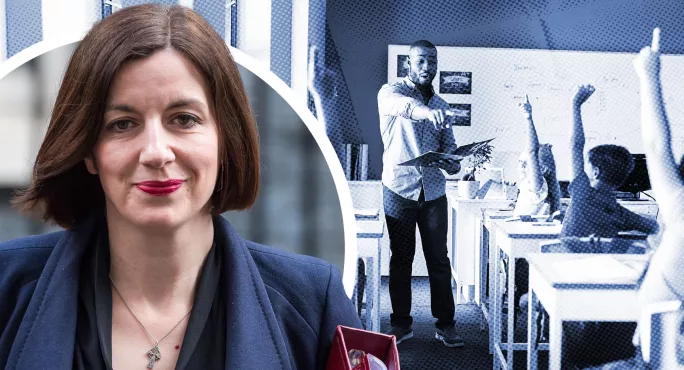The education secretary will today call for more men to join the teaching profession to act as role models for male pupils, warning that the behaviour and development of boys is a ŌĆ£defining issue of our timeŌĆØ.
However, at an event in London, Bridget Phillipson will say that the responsibility to combat ŌĆ£toxic online influencesŌĆØ cannot rest with schools alone.
Speaking at the childrenŌĆÖs commissionerŌĆÖs event Festival Of Childhood: Our Future, Our Voice this morning, she will say: ŌĆ£With toxic online influences on the rise, our boys need strong, positive male role models to look up to. At home, of course, and at school, too. Schools canŌĆÖt solve these problems alone, and responsibility starts at home with parents.ŌĆØ
Ms Phillipson will add that only one in four school teachers are men, with this proportion falling to just one in seven in nursery and primary schools and one in 33 in early years settings.
ŌĆ£Since 2010 the number of teachers in our schools has increased by 28,000 - but just 533 of those are men. ThatŌĆÖs extraordinary,ŌĆØ she is due to say.
Tackling ŌĆśtoxicŌĆÖ male influencers
Her comments will come after prime minister Sir Keir Starmer welcomed a move by Netflix to make the popular TV series Adolescence available to screen for free in secondary schools.
The programme has encouraged a national conversation about the impact of social media and male influencers.
Also speaking at the festival, childrenŌĆÖs commissioner Dame Rachel de Souza will warn of a ŌĆ£crisis developing in childhoodŌĆØ.
Dame Rachel will say that young people are increasingly turning to technology and need adults to respond to them more quickly than online chatbots do.
She will say that there is a risk of inaction and apathy among adults in responding to young people, suggesting that the internet and artificial intelligence could end up filling these gaps.
The childrenŌĆÖs commissionerŌĆÖs office polled 19,000 schools, which the office said represents almost 90 per cent of those in England, about concerns for children in their communities beyond education.
Some 71 per cent were concerned about access to child and adolescent mental health services (Camhs), 55 per cent were worried about online safety and 46 per cent were worried about the impact of poverty.
A ŌĆścrisisŌĆÖ in childhood
Dame Rachel will tell delegates that some of the ŌĆ£foundations of childhood are crackingŌĆØ.
ŌĆ£A different version of childhood is playing out - one that we are struggling to be honest about: a crisis developing in childhood,ŌĆØ she will say.
ŌĆ£There is a risk of inaction, of apathy - and the antidote to this is listening, connecting. That is why we must listen to children, to engage them on the decisions about their lives.ŌĆØ
Dame Rachel will add: ŌĆ£If we want children to experience the vivid technicolour of life, the joy of childhood, the innocence of youth, we have to prove that we will respond more quickly to them than ChatGPT.ŌĆØ
The childrenŌĆÖs commissioner is also expected to set out her focus areas for the next 12 months, including access to childrenŌĆÖs mental health services, childrenŌĆÖs trust in the police, harms caused by ŌĆ£deepfakeŌĆØ technology, and the use of mobile phones in schools.
Fears about childrenŌĆÖs internet access
The access that children have to the internet in their bedrooms was revealed by a poll of parents, published this week by Ipsos for the PA news agency.
Two-thirds of parents of a child aged between 5 and 16 said their child has a computer or other screen with access to the internet that they use in their bedroom.
The proportion saying their child has a screen with internet access in their bedroom rose to 78 per cent for those with a child aged between 11 and 16.
Three-quarters of all parents questioned said they are concerned about what their children are seeing, hearing or doing online, and 87 per cent said they are not confident they know what content they are viewing.
The survey comes after a majority of primary teachers called for the minimum age requirements for social media platforms to be increased.
For the latest education news and analysis delivered every weekday morning, sign up for the Tes Daily newsletter





